- Home
- Shannon Hale
Austenland
Austenland Read online
austenland
A NOVEL
shannon hale
BLOOMSBURY
For Colin Firth
You’re a really great guy, but I’m married, so I think we should just be friends.
Contents
prologue
1 year ago
6 months ago
3 weeks and 1 day ago
First Love: Alex Bipley, AGE FOUR
day 1
Boyfriend #1: Justin Kimble, AGE TWELVE
days 2–4
Boyfriend #2 : Rudy Tiev, AGE FIFTEEN
day 4, continued
Boyfriend #3 : Dave Atters, AGE SIXTEEN
days 5–6
Boyfriend #4: Ray Riboldi, AGE SEVENTEEN
day 7
Boyfriend #5: Rahim (last name forgotten), AGE “THIRTY-FIVE” (POSSIBLY FORTY+)
day 7, continued
Boyfriend #6: Josh Lake, AGE TWENTY
day 8
boyfriends #6 and #7 Paul Diaz, TWENTY-SOMETHING
day 8, continued
Boyfriend #7: Juan Inskeep, AGE TWENTY-FIVE
day 9
Boyfriend #8: Bobby Winkle, AGE TWENTY-THREE
days 9–10
Boyfriend #9: Kevin Hyde, AGE TWENTY-SEVEN
day 11
Boyfriend #10: Peter Sosa, AGE TWENTY-NINE
days 12–13
Boyfriend #11: Clark Barnyard, AGE TWENTY-THREE
days 14–18
Boyfriend #12: Tad Harrison, AGE THIRTY-FIVE
day 19
Boyfriend #12: Jake Zeiger, AGE THIRTY-ISH
day 20
Boyfriend #13: Jimmy Rimer, AGE THIRTY-EIGHT
day 21
Martin of Sheffield, AGE TWENTY-NINE
the end of day 21
Henry
acknowledgments
a note on the author
reading group guide
for discussion
suggested reading
a note on the author
by the same author
prologue
IT IS A TRUTH UNIVERSALLY acknowledged that a thirty-something woman in possession of a satisfying career and fabulous hairdo must be in want of very little, and Jane Hayes, pretty enough and clever enough, was certainly thought to have little to distress her. There was no husband, but those weren’t necessary anymore. There were boyfriends, and if they came and went in a regular stream of mutual dissatisfaction—well, that was the way of things, wasn’t it?
But Jane had a secret. By day, she bustled and luncheoned and e-mailed and over-timed and just-in-timed, but sometimes, when she had the time to slip off her consignment store pumps and lounge on her hand-me-down sofa, she dimmed the lights, turned on her nine-inch television, and acknowledged what was missing.
Sometimes, she watched Pride and Prejudice.
You know, the BBC double DVD version, starring Colin Firth as the delicious Mr. Darcy and that comely, busty English actress as the Elizabeth Bennet we had imagined all along. Jane watched and rewatched the part where Elizabeth and Mr. Darcy look at each other over the piano, and there’s that zing, and her face softens, and he smiles, his chest heaving as though he’d breathe in the sight of her, and his eyes are glistening so that you’d almost think he’d cry . . . Ah!
Each time, Jane’s heart banged, her skin chilled, and she clamped down on the distracting ache in her gut with a bowl of something naughty, like Cocoa Pebbles. That night she would dream of gentlemen in Abraham Lincoln hats, and then in the morning laugh at herself and toy with the idea of hauling those DVDs and all her Austen books to the second-hand store.
Of course, she never did.
That pesky movie version was the culprit. Sure, Jane had first read Pride and Prejudice when she was sixteen, read it a dozen times since, and read the other Austen novels at least twice, except Northanger Abbey (of course). But it wasn’t until the BBC put a face on the story that those gentlemen in tight breeches had stepped out of her reader’s imagination and into her nonfiction hopes. Stripped of Austen’s funny, insightful, biting narrator, the movie became a pure romance. And Pride and Prejudice was the most stunning, bite-your-hand romance ever, the kind that stared straight into Jane’s soul and made her shudder.
It was embarrassing. She didn’t really want to talk about it. So let’s move on.
1 year ago
JANE’S MOTHER, SHIRLEY, CAME TO visit and brought along Great-Aunt Carolyn. It was an awkward gathering, and in the lapses of conversation, Jane could hear dead leaves crack as they hit her apartment floor. She loved her houseplants, but keeping them alive seemed beyond her skills.
“Really, Jane, I don’t know how you survive here,” said Shirley, picking the brittle leaves from among the sallow green ones. “We had a near-death experience in your coffin-of-an-elevator, didn’t we Carolyn, dear? I’m sure your poor aunt wants to relax, but it’s like a sauna in here and not a moment of silence— traffic, car alarms, sirens nonstop. Are you sure your windows aren’t open?”
“It’s Manhattan, Mom. That’s just how it is.”
“Well, I don’t know about that.” She took a scolding stance, hand on hip. The sixty-year-old wood floor grunted beneath her feet. “I just picked up Carolyn from her apartment, and sitting in her front room it was so blessedly quiet I could have sworn we were in the country.”
That’s because money buys thick windows, Jane thought.
“Never mind. Tell me, how’s your . . .”
Please don’t say it! Jane thought. Don’t ask about my love life!
“. . . friend Molly doing?”
“Oh, Molly. Yeah, she’s great, working freelance for the paper since she had the twins. Molly and I have been friends since the sixth grade,” Jane explained to Carolyn, who sat in her wheelchair by the front door.
Carolyn had as many wrinkles in her face as there are ridges in a fingerprint, not just around her eyes and on her brow, but delicate folds rippling across her thin cheeks. She returned a blank stare then tweaked it slightly, an intimation of rolling her eyes. Jane didn’t know if it was pointed or conspiratorial, so she pretended not to notice.
She hadn’t seen Carolyn since she was twelve, at her grandmother’s funeral. It had struck her as odd that when her mother came into the city, Shirley had insisted on including Carolyn in their lunch plans. But from the hungry, significant looks her mother kept pushing on her, Jane could guess—the old woman was getting older, and Shirley wanted to make an impression, a last bid for the remains of the seafood fortune. No doubt picking up Jane at her apartment rather than meeting at the restaurant was a ploy to show Carolyn her great-niece’s shameful living conditions.
“Shall we skedaddle?” asked Jane, eager to get the meddling over with.
“Yes, sweetheart, let me just fix your hair.”
And Jane, age thirty-two, followed her mother into the bathroom and submitted herself to the slicking and spraying and twisting. No matter her age, whenever her mother did her hair, Jane felt exactly seven years old. But she let her mom go to town, because Shirley “Miss French Twist 1967” Hayes could only find true tranquillity in a well-placed do.
“Be sure you listen, dear,” said Shirley, delivering her hushed, urgent lecture on How to Impress the Elderly. “They love that. Ask her about her childhood and let her go on, if she’s so inclined. At this point in her life, memories are all she has left, poor lamb.”
When they emerged from the bathroom, Carolyn wasn’t where they had left her. Jane rushed into the next room, jolted with a nightmare of a wheelchair bumping down the stairs (and with it an unnerving flashback of watching The Changeling at her eleventh birthday slumber party). But there was Carolyn by the window, leaning over to tug a floor plant into the yellow square of sunlight. Jane heard a thwack
as her Pride and Prejudice DVDs fell from their arboreal hideaway and onto the floor.
Jane felt herself flush. Carolyn smiled, her uncountable cheek wrinkles gathered into a few deeper ones.
Really, so what if she had seen the DVDs? A lot of people owned them. Why should she hide them? She didn’t hide her copy of Arrested Development: Season 1 or Yoga for Dummies. Still, something in Carolyn’s smile made her feel as though she stood there in her underwear. Dirty underwear.
At the restaurant when Shirley left to powder her proverbial nose, Jane did her best to pretend she was not the least bit uncomfortable. A minute of silence passed. She plowed her garden salad with a fork, weeding out the arugula.
“It’s been a warm autumn,” she offered.
“You’re wondering if I saw it,” Carolyn said. Some voices get hard and tight with age, some rough like broken glass. Her voice was soft, sand beat by waves till it’s as fine as powdered sugar.
“Saw what?” Jane asked halfheartedly.
“He is a devil, that Mr. Darcy. But you wouldn’t hide him in a houseplant if you didn’t have a guilty conscience. That tells me you’re not idly daydreaming. You’re past thirty, not married, not dating—if your mother’s gossip and the photos in your apartment tell the truth. And it all comes down to that story. You’re obsessed.”
Jane laughed. “I am not obsessed.”
But really she was.
“Hm. You’re blushing. Tell me, what is it about that story that’s so intoxicating?”
Jane gulped down her water and glanced over her shoulder toward the ladies’ room, making sure her mother wasn’t returning. “Besides being witty and funny and maybe the best novel ever written, it’s also the most perfect romance in all of literature and nothing in life can ever measure up, so I spend my life limping in its shadow.”
Carolyn stared, as if waiting for more. Jane thought she’d said enough already.
“It is a lovely novel,” Carolyn said, “but you weren’t concealing a paperback in your plant. I’ve seen the movie. I know who Colin Firth is, my dear. And I think I know what you’ve put your life on hold to wait for.”
“Listen, I don’t actually believe I can somehow end up married to Mr. Darcy. I just . . . nothing in real life feels as right as . . . oh, never mind, I don’t want you believing your great-niece is living in a fantasyland.”
“Are you?”
Jane forced a smile. “Warm autumn, isn’t it?”
Carolyn pressed her lips together so they were as wrinkled as her cheeks. “How’s your love life?”
“I’m on the wagon.”
“Is that so? Giving up at age thirty-two. Hm. May I hazard a guess?” Carolyn leaned forward, her silky voice easing between the sounds of clattering plates and too-hardy businessmen laughter. “Things aren’t working out so well, and each time the men in your life disappoint, you let Mr. Darcy in a little bit more. Perhaps you’ve come to the point where you’re so attached to the idea of that scoundrel, you won’t be satisfied with anything less.”
An olive stuck to the piece of lettuce on Jane’s fork, and when she tried to flick it off, it flew over the table and tapped a waiter in the butt. Jane scowled. Certainly, her list of ex-boyfriends was impressively pathetic. And there was that dream she’d had a few weeks ago—she’d been dressed in a ragged wedding gown (à la Miss Havisham of Great Expectations fame), dancing alone in a dark house, waiting for Mr. Darcy to come for her. When she awoke with a sharp intake of breath, the dream had been still too raw and terrifying to laugh at. In fact, she still couldn’t.
“Maybe I am batty,” Jane said.
“I remember you, Jane.” Carolyn had pale blue eyes like denim washed too often. “I remember sitting in that gazebo with you by the lake after my sister’s, your grandmother’s, funeral. I remember you weren’t afraid to say how during the service you couldn’t help wondering what might be for lunch and was that wrong? Did that mean that you didn’t love your grandma enough? Your voice, your little girl questions took some of the sting out of my grief. You’re too honest to let yourself get duped like this.”
Jane nodded. “That day, you were wearing a lace collar. I thought it was elegant.”
“My late husband bought me that dress. It was my favorite.” Carolyn refolded her napkin, smoothing the edge with slightly shaky hands. “Harold and I had a miserable marriage. He didn’t talk much and was busy with work. I got bored and was rich enough to date delectable young men on the side. After a time, Harold fooled around, too, mostly to hurt me, I think. It wasn’t until I was too old to attract the playboys anymore that I turned to the man next to me and realized how much I loved his face. We had two blissful years together before his heart took him out. I was such a fool, Jane. I couldn’t see what was real until time had washed away everything else.” She was matter-of-fact, the pain behind the words worn out long ago.
“I’m sorry.”
“Hmph. It’d be better to be sorry for yourself. I’m old and rich, and people let me say whatever I want. So here it is. Figure out what is real for you. No use leaning on someone else’s story all your life. You know, that book did Austen herself no good—died a spinster.”
“I know.” The thought had haunted Jane many times, and it was a favorite weapon of anti-Austen enthusiasts.
“Not that there’s anything wrong with spinsters,” Carolyn said, patting the fragile folds in her neck.
“Of course not. Spinster is just an archaic term for ‘career-minded.’”
“Listen, sweetie, my story’s told. I’ve had my dancing days, and I’m facing my own The End. But sky and stars know how your story will turn out. So go make your happily-ever-after happen.” Her voice had a Little League coach enthusiasm. It was sweetly patronizing. Time to change the subject. Very nonchalantly.
“Why don’t you tell me about your childhood, Aunt Carolyn?”
Carolyn laughed, soft as room-temperature butter. “Tell you about my childhood, and just in the nick of time. Well, don’t mind if I do. I was a limper from the time I could walk. Our folks were poor and your grandma and I shared a bed that leaned to one side, though I can’t be sure if that bed was the cause . . .”
When Shirley returned from the restroom, Carolyn was quoting the price of milk when she was a child, and Shirley gave her daughter an approving smile. Thanks be she hadn’t overheard the batty-great-niece part of the conversation. Her mother was practical from her robust eyeglass frames to her thick-heeled shoes, and no daughter of hers would dally about in a fantasyland.
And Jane was eager to agree. Seriously, a thirty-something woman shouldn’t be daydreaming about a fictional character in a two-hundred-year-old world to the point where it interfered with her very real and much more important life and relationships. Of course she shouldn’t.
Jane crunched down on a piece of arugula.
6 months ago
GREAT-AUNT CAROLYN PASSED AWAY.
“And you’re in the will, dear!” her mother said, calling from Vermont. “Apparently our last-minute lunch did the trick. The lawyer will be in touch. Call me the moment you learn the amount!”
Jane hung up and sat down, forcing herself not to think about the will, spending a few moments with the thought of the woman who’d loved Harold’s face, who’d wasted three decades of loving, who’d ripped open Jane’s chest and laid out what she saw. She had not known Carolyn well enough to grieve, only to feel softened, mystified by the idea of death.
And yet, Carolyn had thought of Jane enough to scratch her name into the will. What would she leave a near-stranger relative? Carolyn had a large family so the amount couldn’t be much, but then again the rumors of her great-aunt’s wealth were legendary. Enough to move her into an apartment with air-conditioning? Enough to retire?
Jane balked at that thought. It wasn’t so much that she loved her job—it wasn’t bad work, doing graphic design at the magazine, but it was, you know, a job. She couldn’t knock such a nice piece of stability, somewhere to go
every day, something (unlike men) that didn’t rip the rug out from under her and send her sprawling. But on the subway ride to the attorney’s, Jane wondered, if she were tempted with a huge sum, would she fold? Would she quit her job and buy a house in the Hamptons and adopt a miniature poodle named Porridge who peed on the carpet?
These questions and alternate names for the poodle kept her mind busy as she traveled up into the law firm’s sleek gray building, up into the conservative burgundy and tan office, down into a stuffed leather chair to hear the extraordinarily pale lawyer say, “You’re not rich.”
“What?”
“In fact, she didn’t leave you any money at all.” His every blink was slow and deliberate, reminding Jane of a frog. “People often hope, so I like to get that out up front.”
Jane laughed uneasily. “Oh, I wasn’t thinking that.”
“Of course.” The attorney sat down and sorted through a stack of papers with no wasted movement. He was saying something in lawyer-ese, but Jane was distracted. She was trying to figure out what besides the measured blinking made him seem so amphibious. His taut, shiny complexion, she decided. And his eyes being so wide apart. And his salad green tone. (Okay, he wasn’t actually green, but the rest was true.)

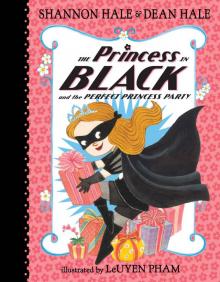 The Princess in Black and the Perfect Princess Party
The Princess in Black and the Perfect Princess Party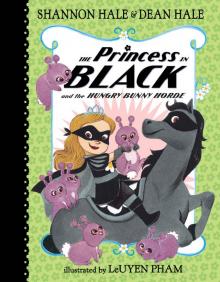 The Princess in Black and the Hungry Bunny Horde
The Princess in Black and the Hungry Bunny Horde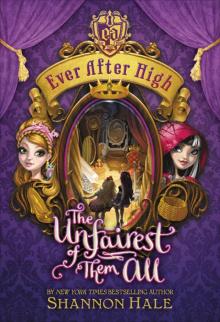 The Unfairest of Them All
The Unfairest of Them All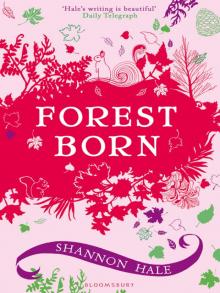 Forest Born
Forest Born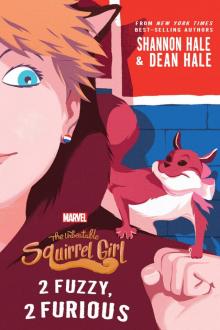 2 Fuzzy, 2 Furious
2 Fuzzy, 2 Furious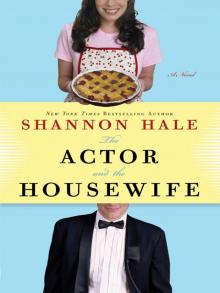 The Actor and the Housewife
The Actor and the Housewife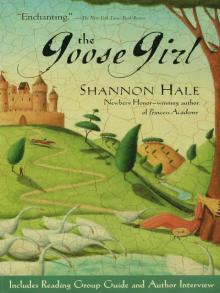 The Goose Girl
The Goose Girl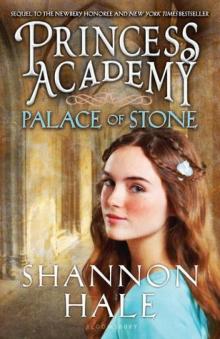 Palace of Stone
Palace of Stone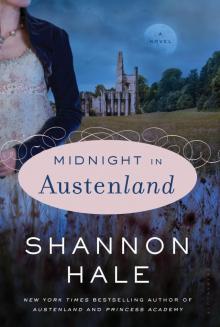 Midnight in Austenland
Midnight in Austenland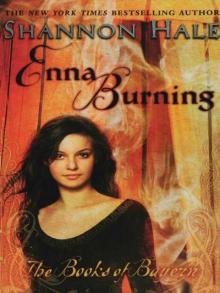 Enna Burning
Enna Burning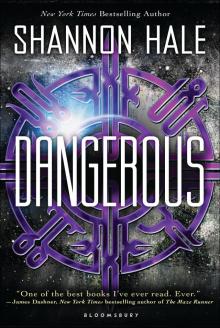 Dangerous
Dangerous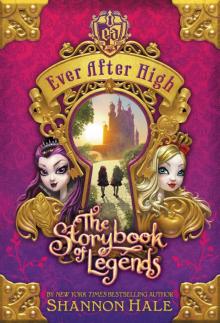 The Storybook of Legends
The Storybook of Legends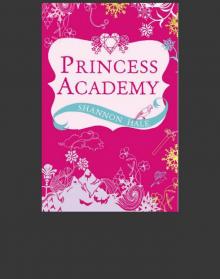 Princess Academy
Princess Academy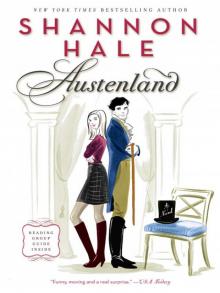 Austenland
Austenland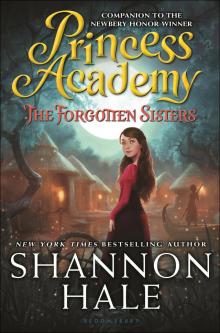 The Forgotten Sisters
The Forgotten Sisters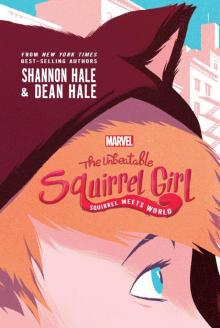 The Unbeatable Squirrel Girl: Squirrel Meets World
The Unbeatable Squirrel Girl: Squirrel Meets World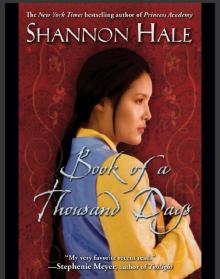 Book of a Thousand Days
Book of a Thousand Days Fire and Ice
Fire and Ice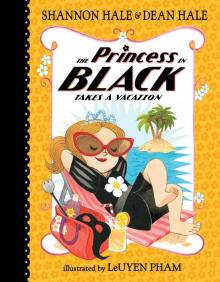 The Princess in Black Takes a Vacation
The Princess in Black Takes a Vacation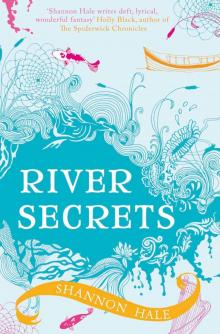 River Secrets
River Secrets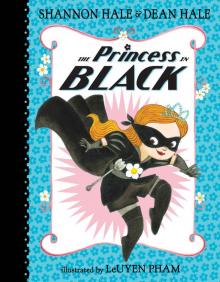 The Princess in Black
The Princess in Black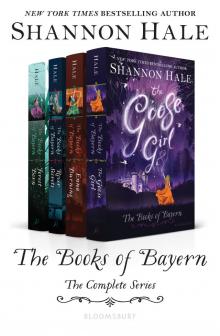 Books of Bayern Series Bundle
Books of Bayern Series Bundle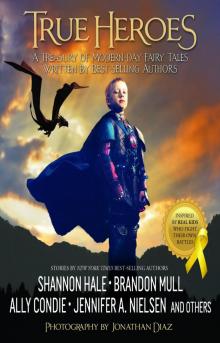 True Heroes
True Heroes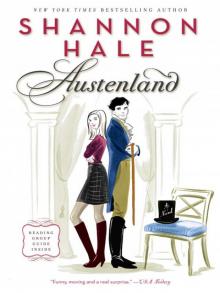 Austenland: A Novel
Austenland: A Novel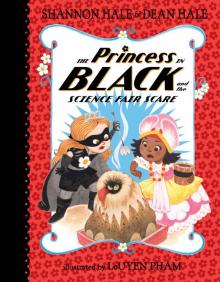 The Princess in Black and the Science Fair Scare
The Princess in Black and the Science Fair Scare![[Bayern 02] - Enna Burning Read online](http://i1.bookreadfree.com/i1/04/02/bayern_02_-_enna_burning_preview.jpg) [Bayern 02] - Enna Burning
[Bayern 02] - Enna Burning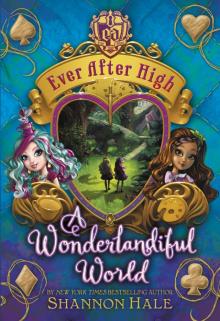 Ever After High
Ever After High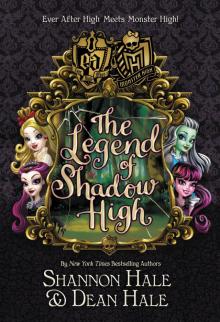 Monster High/Ever After High--The Legend of Shadow High
Monster High/Ever After High--The Legend of Shadow High